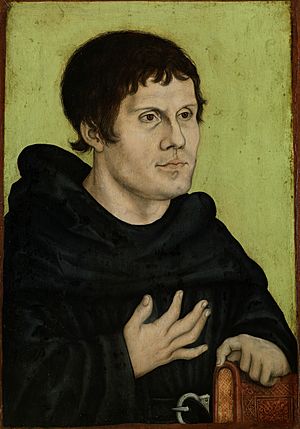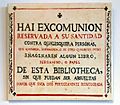Excommunication facts for kids
Excommunication is a serious religious action. It means someone is officially removed or suspended from being a member of a religious group or church.
The word "excommunication" literally means "out of communion." This means a person is no longer connected or sharing in the religious community's activities. In some churches, people believe that being excommunicated can affect a person's afterlife. Sometimes, other punishments follow excommunication. These can include being banned from certain places, being ignored by the community (called shunning), or being shamed. These actions depend on the rules of the specific religious group.
Contents
What Excommunication Means
Excommunication is a way for religious groups to enforce their rules and beliefs. It is often used when a member has done something considered a very serious offense against the group's teachings. It's like being "kicked out" of a club because you broke a major rule.
This action is usually meant to be a strong warning. It encourages the person to think about their actions and possibly return to the group's rules. It can also protect the community from ideas or actions that the group believes are harmful.
Famous Cases of Excommunication
Throughout history, many well-known people have faced excommunication. These cases often show important moments in religious and political history.
Martin Luther's Excommunication
One of the most famous examples is Martin Luther. He was a German monk who started the Protestant Reformation. In 1521, Pope Leo X excommunicated Luther. This happened because Luther challenged many teachings and practices of the Catholic Church. His excommunication was a major event that led to the creation of many new Christian churches.
Isabelo de los Reyes and the Aglipayan Church
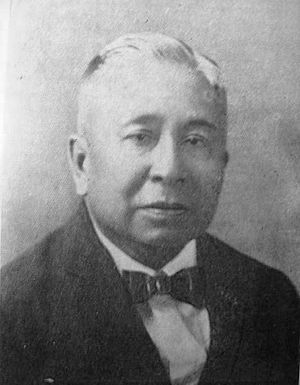
Isabelo de los Reyes was a Filipino writer and activist. He founded the Aglipayan Church (also known as the Philippine Independent Church). In 1903, Pope Leo XIII excommunicated him. This was because de los Reyes led a group that separated from the Catholic Church in the Philippines. This event marked a significant split in the religious history of the Philippines.
Mirza Muhammad ʻAlí's Excommunication
In the Baháʼí Faith, Mírzá Muhammad ʻAlí was the son of Baháʼu'lláh, the founder of the faith. He was excommunicated by his half-brother, ʻAbdu'l-Bahá. This happened because Muhammad ʻAlí challenged ʻAbdu'l-Bahá's leadership. This event was important in shaping the leadership structure of the Baháʼí Faith.
Excommunication and Rules
Excommunication is often linked to specific rules or laws within a religious group. These rules explain what actions can lead to someone being removed from the community.
Rules for Foundling Wheels
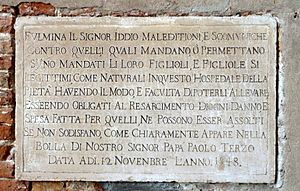
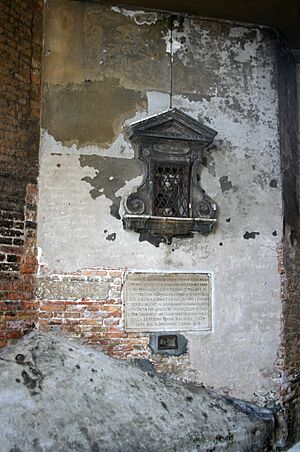
In historical times, some religious rules even involved excommunication for specific social issues. For example, in Venice, Italy, there were rules about abandoning children at "foundling wheels" (places where parents could leave unwanted babies). A plaque from 1548, citing a papal bull from Pope Paul III, declared that parents who abandoned a child they could afford to raise would face "maledictions and excommunications." They could not be forgiven unless they paid back all the costs of raising the child. This shows how seriously some religious groups took the responsibility of parents.
Protecting Books in Libraries
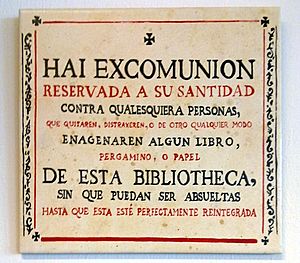
Even stealing books could lead to excommunication in some places! At the University of Salamanca library in Spain, there was a threat of excommunication for anyone who stole books. This shows how important books and knowledge were considered, and how serious the punishment for stealing them could be.
See also
 In Spanish: Excomunión para niños
In Spanish: Excomunión para niños
Images for kids
-
Details of the excommunication penalty at the foundling wheel in Venice, Italy
-
Mírzá Muhammad ʻAlí, son of Baháʼu'lláh was excommunicated by ʻAbdu'l-Bahá.
-
Plaque on exterior of the Chiesa della Pietà in Venice, the church of the orphanage. This is where the foundling wheel once stood. The inscription declares, citing a 12 November 1548 papal bull of Pope Paul III, that God inflicts "maledictions and excommunications" on all who abandon a child of theirs whom they have the means to rear, and that they cannot be absolved unless they first refund all expenses incurred.
-
Martin Luther was excommunicated by Pope Leo X in 1521.
-
Threat of excommunication for stealing books from the Salamanca University library
-
Isabelo de los Reyes, founder of the Aglipayan Church was excommunicated by Pope Leo XIII in 1903 as a schismatic apostate.
 | Lonnie Johnson |
 | Granville Woods |
 | Lewis Howard Latimer |
 | James West |


